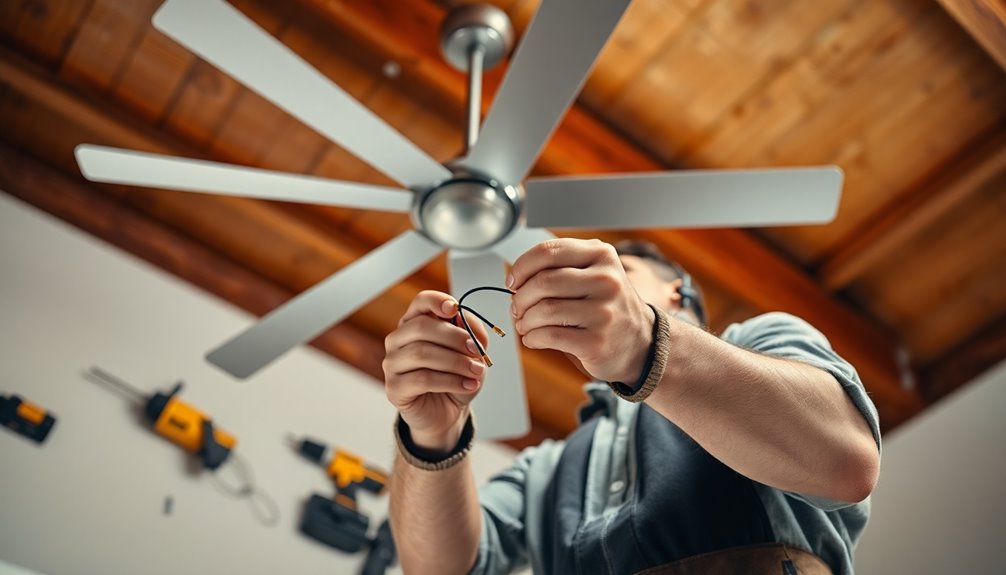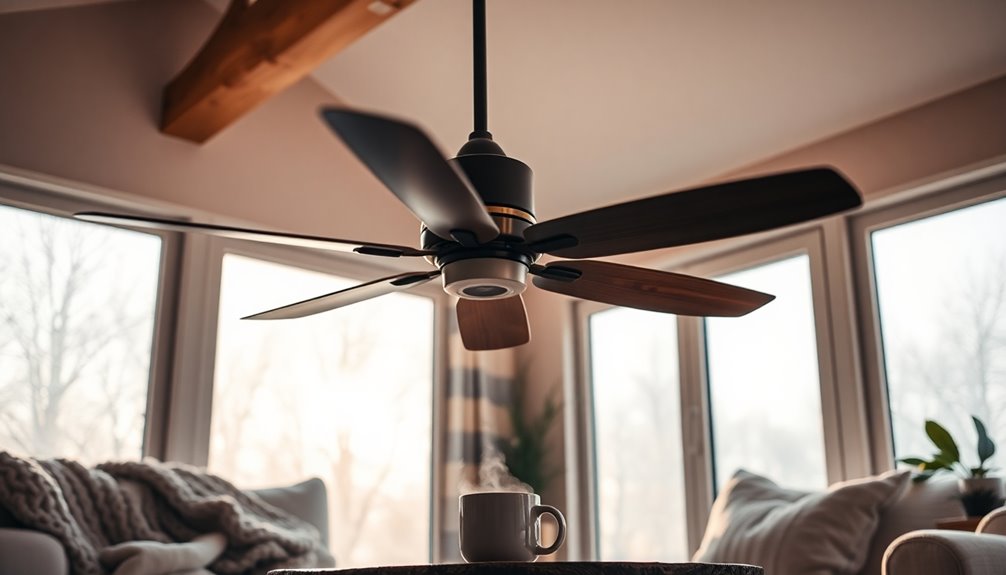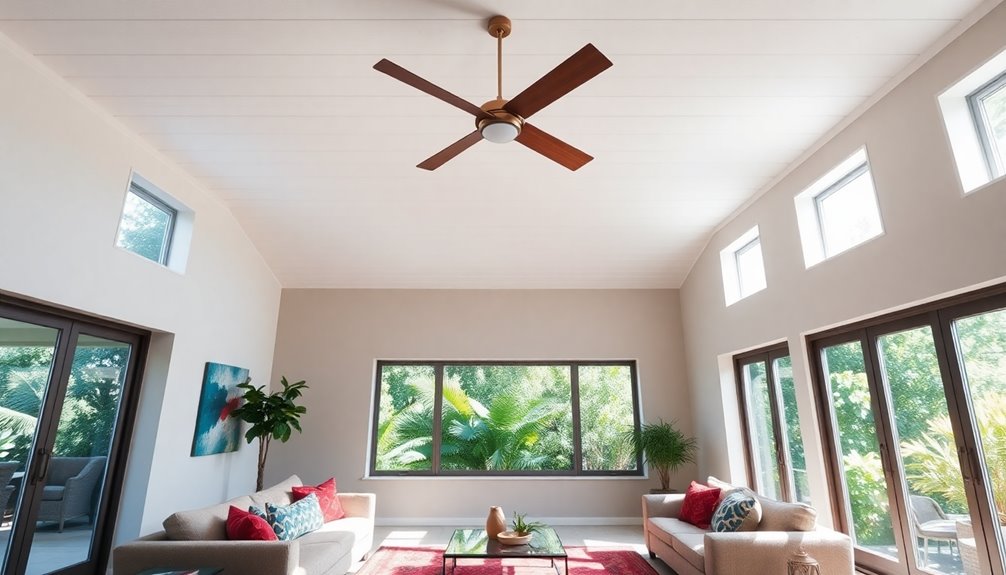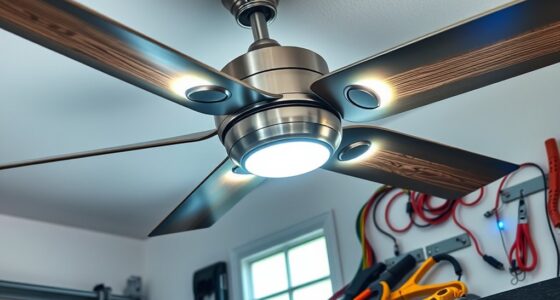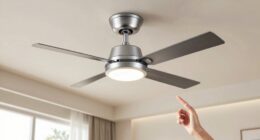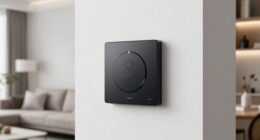Yes, a handyman can install a ceiling fan, but it depends on their qualifications and local regulations. Many areas require licensing for electrical work, so make certain your handyman is compliant. If they're experienced, they can handle the job and guarantee safety. However, remember that improper installation can lead to issues like wobbling or even risks of electrical fires. For a hassle-free experience, consider hiring a licensed electrician, who assures adherence to safety codes and standards. Want to find out more about what's involved in the installation process?
Key Takeaways
- A handyman can install a ceiling fan, but their qualifications must be verified to ensure safety and compliance with local regulations.
- Many states require licensed electricians for electrical installations, including ceiling fans, to meet safety codes.
- Improper installation by unqualified individuals can lead to risks such as electrocution, fires, and costly repairs.
- Licensed electricians have the expertise to assess wiring and minimize risks associated with installation, ensuring proper airflow and stability.
- Hiring a professional protects warranties from ceiling fan manufacturers and ensures adherence to electrical codes.
Benefits of Hiring Professionals

When you hire a professional electrician to install your ceiling fan, you not only guarantee compliance with local electrical codes but also markedly reduce safety risks.
A licensed electrician has the expertise to assess your existing wiring and guarantee it's suitable for the installation, addressing any potential hazards that come with improper connections. This professional installation minimizes the likelihood of common issues, such as wobbling or electrical problems, which could lead to costly repairs averaging between $88 to $197.
Moreover, many ceiling fan manufacturers require that installations be performed by licensed professionals to maintain warranties. By hiring a qualified electrician, you not only protect your investment but also gain peace of mind knowing the job is done right.
Although the average cost of hiring an electrician ranges from $144 to $353, this expense is a worthwhile investment in safety and quality.
In the end, opting for professional help guarantees that your ceiling fan operates efficiently and safely, preventing potential legal issues and providing a reliable solution for your home's comfort.
DIY Installation Risks

Installing a ceiling fan yourself might seem like a straightforward task, but the risks involved can be significant. When tackling electrical tasks without a solid understanding, you could face dangerous situations like electrocution or fires. Additionally, understanding your credit score can be beneficial when budgeting for professional help. AI technology significantly enhances cybersecurity measures, which can be relevant if you decide to seek assistance online.
Mistakes during the installation process can lead to costly repairs, averaging between $88 and $197. Many homeowners underestimate how complex ceiling fan installations can be, often requiring physical assistance for secure mounting. For example, using a vacuum with a HEPA filter can help maintain a clean environment while working on home projects.
Improper installations can result in wobbling fans or inadequate airflow, frustrating your efforts to create a comfortable environment. It's crucial to evaluate your own capability against the complexity of the job. Additionally, the features of luxury ceiling fans often require careful consideration during installation to ensure optimal performance and safety, especially with integrated lighting options that may complicate the wiring process.
If you find yourself in over your head, the cost to install a ceiling fan by a licensed electrician may actually save you money in the long run. Hiring a pro can guarantee that the job is done correctly, leading to happy customers who enjoy their fans without worry. In the end, while DIY projects can be rewarding, the potential DIY installation risks associated with ceiling fan installations might make you reconsider taking on this task yourself.
Handyman vs. Electrician

Considering the risks of DIY ceiling fan installation, many homeowners weigh their options between hiring a handyman and a licensed electrician.
While handymen can tackle simple tasks, ceiling fan installation often requires the expertise of a licensed electrician due to the complexities involved in electrical work.
Here's a quick comparison to help you decide:
- Safety Compliance: Licensed electricians guarantee that your ceiling fan installation meets all safety standards and local codes.
- Expertise: A qualified electrician possesses specialized knowledge about wiring and load requirements, reducing the risk of electrical fires.
- Legal Considerations: Many states mandate that electrical installations, including ceiling fans, be performed by licensed professionals. Hiring an unlicensed handyman could lead to legal issues.
- Insurance: Licensed electricians are usually insured, protecting you from potential liabilities during the installation process.
While some handymen may have limited licenses for electrical work, it's vital to verify their qualifications.
Ultimately, hiring a licensed electrician not only guarantees proper installation but also gives you peace of mind.
When you're ready to install a ceiling fan, think safety and expertise—choose a qualified electrician.
Installation Process Overview

The installation process for a ceiling fan involves several key steps to guarantee a seamless experience. First, you'll want to choose a Tasker based on their price, skills, and customer reviews. This assures quality work tailored to your needs. Once you've selected a Tasker, schedule an appointment for the installation, making sure to communicate any specific requirements or preferences you have.
The actual installation may take up to three hours, especially if existing wiring isn't in place. However, if the wiring is already set up, it could take as little as one hour. It's vital to make sure that your Tasker is equipped to handle any additional electrical work needed, such as new wiring or support structures.
Here's a quick overview of the installation process:
| Step | Description |
|---|---|
| Choose a Tasker | Compare prices and reviews |
| Schedule Appointment | Discuss requirements with Tasker |
| Installation Duration | 1-3 hours based on wiring |
| Additional Support | Verify Tasker can handle electrical needs |
| Payment & Tips | Use in-app features for convenience |
Legal Considerations for Handymen

Understanding the legal landscape is essential for handymen looking to install ceiling fans. Many states, including Florida, have strict regulations that dictate who can perform electrical work, especially when it comes to installing a ceiling fan.
Here are some key legal considerations you should keep in mind:
- Licensing Requirements: Installing a ceiling fan often requires an electrician's license due to the electrical work involved.
- State Regulations: In Florida, only licensed electrical contractors can be compensated for ceiling fan installations, with serious penalties for unlicensed work.
- Legal Liabilities: If an unlicensed handyman's work leads to incidents like fires, legal repercussions can be severe.
- Expansion of Services: Obtaining a Residential Appliance Installer license can allow you to legally perform ceiling fan installations and broaden your home improvement services.
Ignoring these legal considerations can create a false sense of security, putting you at risk for potential legal issues.
Always prioritize compliance with local regulations and consider partnering with licensed professionals when plumbing and electrical work is involved.
Frequently Asked Questions
Can a Non-Electrician Install a Ceiling Fan?
You might wonder if a non-electrician can install a ceiling fan.
While some simple setups may be manageable, it's essential to know that complex electrical work often requires specialized knowledge.
If you're not familiar with electrical systems, you could face safety risks like fires or electrocution.
Additionally, DIY installations might void warranties.
To guarantee safety and compliance, it's wise to take into account hiring a licensed professional for this task.
How Much Should It Cost to Have Someone Install a Ceiling Fan?
You might think installing a ceiling fan is a simple task, but it can cost you if you mess it up!
Typically, hiring a professional will set you back anywhere from $144 to $353, with $250 being the sweet spot.
In Houston, expect to pay around $45 per hour for mounting services.
How Much Does Home Depot Charge to Install a Fan?
Home Depot typically charges between $129 and $199 for ceiling fan installation, depending on how complex the job is and where your home is located.
If you need additional electrical work, expect to pay extra—wiring costs range from $50 to $150.
Installation usually takes about 2 to 3 hours.
It's a good idea to schedule a consultation with a representative to get a precise quote based on your specific needs.
Can a Handyman Replace a Ceiling Fan in Texas?
"Don't bite off more than you can chew."
In Texas, you can hire a handyman to replace your ceiling fan, as long as it doesn't involve complex electrical work.
Make certain they check that the mounting and electrical support are adequate for the new fan.
However, if you're considering new wiring or major modifications, it's best to call a licensed electrician to guarantee everything meets safety standards and local regulations.
Conclusion
So, can a handyman install a ceiling fan? While the answer might seem straightforward, the risks and legalities lurking beneath the surface could surprise you. You might find yourself pondering the fine line between convenience and safety. Choosing a handyman could save you time, but what if they miss a vital step? The comfort of a cool breeze could quickly turn into a chilling realization. In the end, it's your decision—just make sure you're aware of what's at stake.
